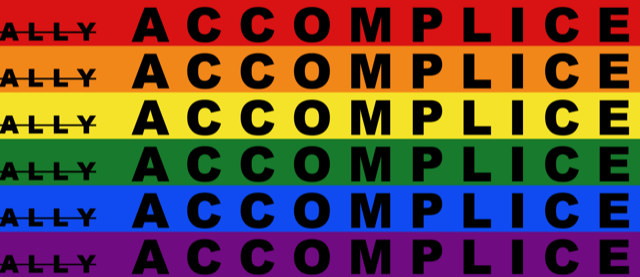
_Sydney Lewis is a first-year journalism and political science major at MU. She is an opinion columnist who writes about politics and identity for The Maneater._
The word ally has become a word used to validate people who give a minute
contribution toward a marginalized community. Most people who call themselves allies do so for the ego boost and guilt reduction, not to genuinely make a positive impact on the community they support. Though they have good intentions, self-proclaimed allies frequently go wrong.
As Mother Jones writer Sam Van Pykeren wrote, “Allies aren’t bad people. It’s just that right now LGBTQ+ people don’t need allies. We need accomplices […] An accomplice is someone who is putting as much on the line, maybe even more, than the other. An accomplice ends up in jail with you. An ally is someone you hope will answer your one phone call.”
On the Black Lives Matter movement, writer Roxane Gay said, “Black people do not need allies. We need people to stand up and take on the problems borne of oppression as their own, without remove or distance.”
Allyship goes wrong when it becomes performative. It has turned into an ill-researched post on an Instagram story. It’s attending a Pride parade for rainbow-themed photos. There is no problem with doing either of those things; The issue is when action stops there.
For companies, performative activism looks like companies engaging in rainbow capitalism — the production of rainbow products during Pride month with a goal of enticing LGBTQ+ customers. These companies often have poor records on LGBTQ+ rights and inclusivity and only use pride month as an opportunity to increase revenue. In 2018, Adidas was criticized for selling rainbow clothing for Pride month and being a sponsor for the World Cup in Russia, a country with anti-LGBTQ+ laws.
In entertainment, this takes the form of queerbaiting when creators attempt to “attract an LGBT audience by hinting at same-sex relationships between characters.” These characters don’t pursue the relationship and instead fulfill their heteronormative role. One of the biggest examples of this being the relationship between Kara Danvers and Lena Luthor on Supergirl which has received criticism from fans.
At MU, students have reported feeling unsafe due to their sexual or gender identity. A 2016 survey found that 36% of trans spectrum students “personally experienced exclusionary, intimidating, offensive or hostile conduct in the past year at MU.” Despite having a resource center dedicated to LGBTQ+ inclusivity, many students still don’t feel welcome. MU tweeted on Oct. 15, 2019: “#Mizzou students and staff gathered at the columns this evening for the annual campus pride photo to support and celebrate the @mulgbtq community. #comingoutweek ??” Their post is not unlike that of companies during Pride month. It showcases support for a community that actually doesn’t feel welcome on campus.
Another dangerous form of allyship is tokenism, which is when a person of a marginalized group is included to prevent criticism and give the appearance of diversity.
This looks like hiring a member of the LGBTQ+ community so the organization looks diverse, but not valuing them as a contributing member, or only hiring them for their diversity. In education, this can look like the use of LGBTQ+ people (often those who fit a stereotype) in recruitment videos, giving the impression they value diversity when the experiences of those included reflect anything but.
MU has implemented initiatives to increase diversity among staff in the past several years, yet in a survey from 2019, faculty of color rated the university lower in every category compared to their white colleagues. In addition to increasing staff diversity, MU should also be making a place where LGBTQ+ faculty and faculty of color have opportunities for advancement, are not alienated and are treated as intellectual equals. These three requests, among others, were raised in an op-ed written by several former faculty of color at MU who left due to issues “related to being racial and ethnic minorities.”
Allyship can be a slippery slope into doing more harm than good. Instead of relying on a label to make a difference, fearless action is a more impactful way to be an accomplice.
_As part of its commitment to highlighting organizations fighting for racial justice, the Maneater is encouraging readers to donate to The National CARES Mentoring Movement, a “pioneering community-galvanizing movement dedicated to alleviating intergenerational poverty among African Americans. It offers Black children in low-income families and unstable communities the social, emotional and academic supports they need to unleash their potential and graduate from high school prepared to succeed in college or vocational-training programs and 21st-century careers.” Donate at: https://www.caresmentoring.org/index.php/donate_
_Edited by Sofi Zeman | [email protected]_